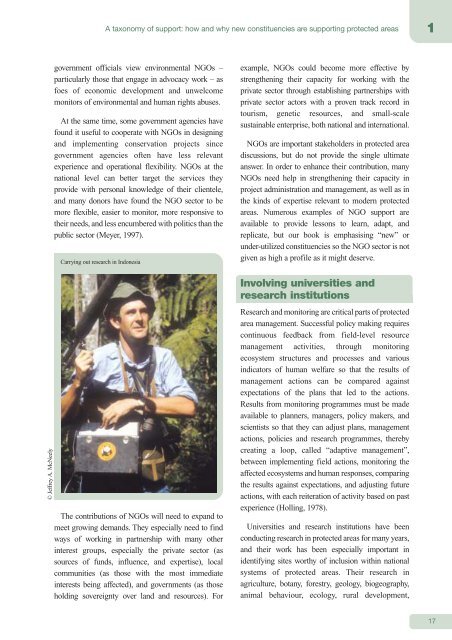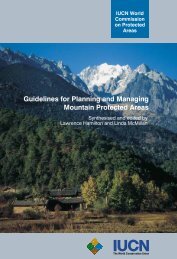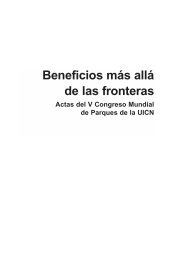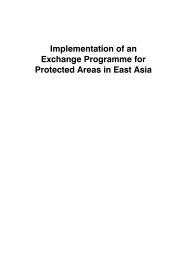1.Front section - IUCN
1.Front section - IUCN
1.Front section - IUCN
You also want an ePaper? Increase the reach of your titles
YUMPU automatically turns print PDFs into web optimized ePapers that Google loves.
A taxonomy of support: how and why new constituencies are supporting protected areas 1<br />
© Jeffrey A. McNeely<br />
government officials view environmental NGOs –<br />
particularly those that engage in advocacy work – as<br />
foes of economic development and unwelcome<br />
monitors of environmental and human rights abuses.<br />
At the same time, some government agencies have<br />
found it useful to cooperate with NGOs in designing<br />
and implementing conservation projects since<br />
government agencies often have less relevant<br />
experience and operational flexibility. NGOs at the<br />
national level can better target the services they<br />
provide with personal knowledge of their clientele,<br />
and many donors have found the NGO sector to be<br />
more flexible, easier to monitor, more responsive to<br />
their needs, and less encumbered with politics than the<br />
public sector (Meyer, 1997).<br />
Carrying out research in Indonesia<br />
The contributions of NGOs will need to expand to<br />
meet growing demands. They especially need to find<br />
ways of working in partnership with many other<br />
interest groups, especially the private sector (as<br />
sources of funds, influence, and expertise), local<br />
communities (as those with the most immediate<br />
interests being affected), and governments (as those<br />
holding sovereignty over land and resources). For<br />
example, NGOs could become more effective by<br />
strengthening their capacity for working with the<br />
private sector through establishing partnerships with<br />
private sector actors with a proven track record in<br />
tourism, genetic resources, and small-scale<br />
sustainable enterprise, both national and international.<br />
NGOs are important stakeholders in protected area<br />
discussions, but do not provide the single ultimate<br />
answer. In order to enhance their contribution, many<br />
NGOs need help in strengthening their capacity in<br />
project administration and management, as well as in<br />
the kinds of expertise relevant to modern protected<br />
areas. Numerous examples of NGO support are<br />
available to provide lessons to learn, adapt, and<br />
replicate, but our book is emphasising “new” or<br />
under-utilized constituencies so the NGO sector is not<br />
given as high a profile as it might deserve.<br />
Involving universities and<br />
research institutions<br />
Research and monitoring are critical parts of protected<br />
area management. Successful policy making requires<br />
continuous feedback from field-level resource<br />
management activities, through monitoring<br />
ecosystem structures and processes and various<br />
indicators of human welfare so that the results of<br />
management actions can be compared against<br />
expectations of the plans that led to the actions.<br />
Results from monitoring programmes must be made<br />
available to planners, managers, policy makers, and<br />
scientists so that they can adjust plans, management<br />
actions, policies and research programmes, thereby<br />
creating a loop, called “adaptive management”,<br />
between implementing field actions, monitoring the<br />
affected ecosystems and human responses, comparing<br />
the results against expectations, and adjusting future<br />
actions, with each reiteration of activity based on past<br />
experience (Holling, 1978).<br />
Universities and research institutions have been<br />
conducting research in protected areas for many years,<br />
and their work has been especially important in<br />
identifying sites worthy of inclusion within national<br />
systems of protected areas. Their research in<br />
agriculture, botany, forestry, geology, biogeography,<br />
animal behaviour, ecology, rural development,<br />
17






